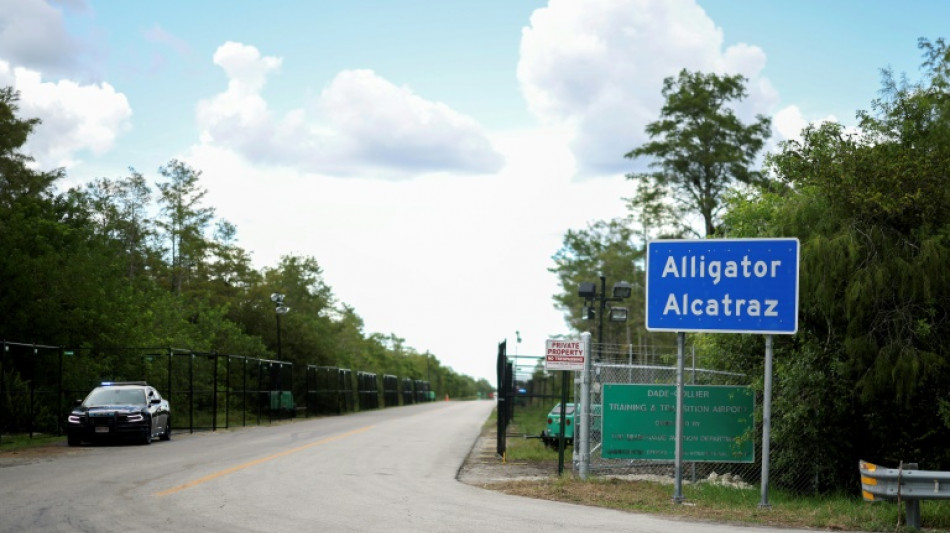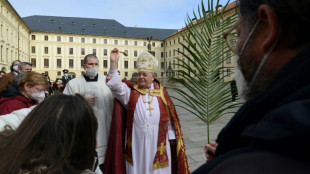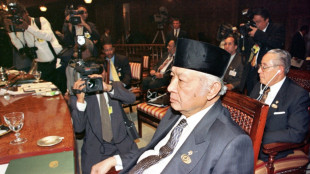

Inside Trump's 'Alligator Alcatraz': detainees allege abuse in a legal black hole
At US President Donald Trump's new migrant detention center in the Florida Everglades, time has no discernible meaning.
Prisoners are barely able to see sunlight in the windowless space, living under fluorescent lamps that are always on, with no clocks or anything else by which they might mark the days.
Several detainees, their family members and lawyers have denounced appalling conditions at the facility, nicknamed "Alligator Alcatraz" by an administration that has likened undocumented migrants to "animals" and promised to deport millions.
AFP spoke with several "Alligator Alcatraz" detainees by phone and obtained further information about conditions there from relatives, lawyers and legal documents.
Detainees spoke of facilities covered in filth, a lack of medical care, mistreatment, and the violation of their legal rights.
"They don't even treat animals like this. This is like torture," said Luis Gonzalez, a 25-year-old Cuban who called AFP from inside the center.
Florida authorities built the facilities in eight days -- opening the center on July 2 at an abandoned airfield in the Everglades wetlands.
Governed by Republican Ron DeSantis, the southeastern state signed an agreement with Immigration and Customs Enforcement (ICE) to detain undocumented foreigners, a power that until now had been reserved for federal authorities.
Now, the Trump administration wants to make this a model for other detention centers across the country.
- Like 'murderers' –
Gonzalez arrived in the United States in 2022 and settled in Florida after authorities released him while his asylum application was being reviewed.
Last month, when an immigration judge dismissed his case, ICE agents arrested him and took him to "Alligator Alcatraz."
They kept him chained by his hands, waist, and feet on a bus with other detainees for more than a day before taking him to one of the large tents that house eight cells each, he said.
"I haven't seen sunlight in the 14 days I've been here," he said.
"When they take us to the dining hall, they take us with our hands on our heads as if we were murderers."
He lives in a cell with about 30 people, a space enclosed by chain-linked fencing that he compares to a chicken coop.
It is hardly ever cleaned, he says, not even the three toilets that everyone shares. At the time of the call, Gonzalez had not showered for a week.
The days are hot, with swarms of mosquitoes in the cells, and the nights are not much better.
- Beatings, attempted suicide –
Gonzalez and other detainees have denounced the lack of medical care available at the site.
Michael Borrego Fernandez, 35, complained of pain but was not treated until he began to bleed, according to his lawyers and legal documents.
He underwent emergency surgery for hemorrhoids, only to have to be hospitalized again when he was not given antibiotics and his wounds became infected.
Some prisoners, such as Marcos Puig, 31, have rebelled.
Before a visit from officials, guards isolated him to prevent him from protesting, he said by phone from another Florida facility where he is now being held.
Outraged, he broke a toilet in his new cell, prompting a dozen guards to enter, handcuff him, and punch and kick him all over his body.
Afterward, he says, they left him kneeling for about 12 hours in a space without cameras or air conditioning before transferring him to another detention facility.
"I arrived here broken. I was covered in bruises," he said.
Another inmate, Gonzalo Almanza Valdes, reported seeing guards "beat up" detainees, according to a recorded phone call with his wife.
Desperation has pushed some to the limit.
On Sunday, Sonia Bichara called her partner, detainee Rafael Collado.
Through the speakerphone, the 63-year-old man said: "I have tried to kill myself twice, I have cut my veins."
When contacted by AFP, Florida authorities denied allegations of abuse.
- 'Completely illegal' –
Activists and lawyers are demanding the closure of the facilities, which are facing two lawsuits.
The first alleges that migrants' right to due process is not being respected.
"There are people who have been there since they arrived and have still not seen a judge. And that cannot be, it is completely illegal," said Magdalena Cuprys, Gonzalez's lawyer.
She said detainees were unable to request bail or a case review because the courts that should be hearing the cases are not doing so, claiming they have no jurisdiction over the state-operated center.
The second lawsuit alleges that the facility threatens the Everglades ecosystem.
Last week, a federal judge ordered a 14-day suspension of all new construction at the center while she reviews the case.
A.Smith--VC







